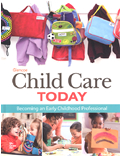
Child Care Today ©2012Chapter 14: Nurturing Infant DevelopmentChapter SummaryInfancy is the most intense period of accelerated growth in a person’s lifetime. Prenatal development includes the zygote, embryo, and fetus stages. Good maternal nutrition and health are important to prenatal development. Infant brains are responsive to positive experiences. Infants need frequent feedings and a lot of sleep to support physical development. All infants have certain reflexes. Infants have all five senses at birth and caregivers should nurture sensory development. Muscular development eventually gives infants mobility, motor skills, and coordination. Infants develop intellectually by using their senses and motor abilities to gain information about the world. Most children acquire object permanence at nine months. Children understand language long before they can speak it. Infants experience emotions and bond to a specific person. Personality development also begins during infancy. It takes several years for children to grow beyond egocentrism. Infants require a lot of physical care from staff. Sleep is essential, and daily sleep routines may change. An infant’s safety must be monitored even while asleep. Soiled diapers should be changed promptly. Create a routine to check diapers, and use a sanitary system for changing. Foods and the quantities eaten should be recorded at each feeding. Infants will start to eat solid foods at about six months. Child care professionals should be responsive to emerging skills, and should interpret cues infants give. Behaviors must be observed exactly, and detailed records should be kept daily. Make sure there are enough classroom resources, and that the environment is sanitary. The maximum number of infants in a program is smaller than for other ages. Infants are often assigned one primary caregiver. Routines are conducted on demand. Caregivers and parents should speak daily about infant development. Plan an environment that allows children to develop physically at their own rate. Verbal and nonverbal experiences with caregivers encourage intellectual development. Make adjustments for children with special needs. Infants learn by using their senses. Safe, secure environments allow for trusting bonds between infants and caregivers. Engage with infants to help them express their emotions. Special relationships with parents, guardians, and primary caregivers foster social development. |  |















